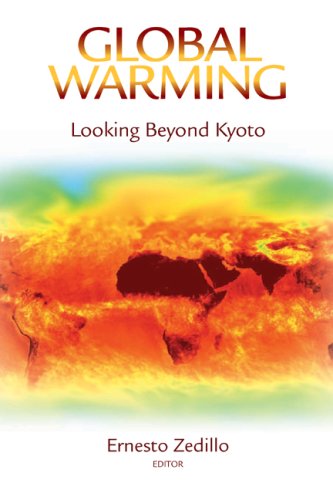

Most ebook files are in PDF format, so you can easily read them using various software such as Foxit Reader or directly on the Google Chrome browser.
Some ebook files are released by publishers in other formats such as .awz, .mobi, .epub, .fb2, etc. You may need to install specific software to read these formats on mobile/PC, such as Calibre.
Please read the tutorial at this link: https://ebookbell.com/faq
We offer FREE conversion to the popular formats you request; however, this may take some time. Therefore, right after payment, please email us, and we will try to provide the service as quickly as possible.
For some exceptional file formats or broken links (if any), please refrain from opening any disputes. Instead, email us first, and we will try to assist within a maximum of 6 hours.
EbookBell Team

4.3
58 reviewsClimate change poses a multidimensional international challenge, one that eludes straightforward solutions. In Global Warming: Looking beyond Kyoto , some of the best-known and respected authorities in climate policy—including members of the Nobel Peace Prize-winning Intergovernmental Panel on Climate Change (IPCC)—provide a comprehensive agenda for global collective action. Representing both industrialized and developing nations, the contributors present a thought-provoking examination of the economic, social, and political context of climate policy within their countries.
There is a growing international consensus that the earth's climate is being changed by anthropogenic greenhouse gases. Evidence presented by the IPCC and others points to the potential for increasingly dangerous weather, new disease outbreaks, regional water shortages, the loss of habitat and species, and other disturbing developments that could have profound social and economic impacts around the globe. Opinion on what should be done to address climate change, however, remains sharply divided within and among countries.
Tension remains between wealthy nations and developing countries regarding the roles and responsibilities of each. Not only are governments and societies wrestling with the complications involved in the provision of a global public good, but they are also dealing with unprecedented uncertainties about the costs and benefits of solutions with a long-term course of delivery. These economics lie at the crux of this issue today, as they have since the Kyoto Protocol was adopted in 1997.
Though monumental in its efforts, the Kyoto Protocol has left much to be agreed upon and achieved, with the world's largest emitter of carbon dioxide—the United States—rejecting it. With Kyoto's emissions targets set to expire in 2012, the authors of this volume call for a multilateral approach that goes beyond the mitigation-focused Kyoto policies, balancing them with strategies for adaptation.
Informed, insightful, and evenhanded, this book gives a new impetus to the increasingly important global climate policy debate.
Contributors: Howard Dalton (University of Warwick), Alexander Golub (Environmental Defense), Thomas Heller (Stanford University), Gernot Klepper (Kiel Institute for World Economics), Richard S. Lindzen (Massachusetts Institute of Technology), Shen Longhai (China Energy Conservation Association), Robert Mendelsohn (Yale University), William D. Nordhaus (Yale University), R. K. Pachauri (Energy Resources Institute and the IPCC), Jyoti Parikh (Integrated Research and Action for Development, New Delhi), Sonja Peterson (Kiel Institute for World Economics), Stefan Rahmstorf (Potsdam Institute for Climate Impact Research), Stephen H. Schneider (Stanford University), Robert N. Stavins (Harvard University), and John Stone (Carleton University, Ottawa)